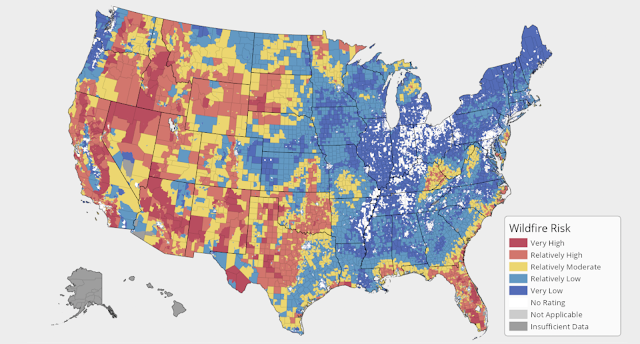 |
| Wildfire Risk Index map (Federal Emergency Management Agency map; click the image to enlarge it) |
Electric utilities have been implicated in wildfires, but in Washington state and elsewhere, state laws may not require them to do much to prevent such disasters or hold them accountable when they do happen, Rebecca Moss reports for The Seattle Times. That has grim implications in Washington, which had the second-most acreage burned due to human negligence in 2020. It also matters in other Western states and wildfire-prone areas across the South and Midwest, especially in cash-strapped rural communities that may have a hard time recovering from damage on their own.
About 85 percent of wildfires in the U.S. are caused by humans, either deliberately or negligently. Poorly maintained utility electrical equipment falls under the category of negligent human behavior, according to the National Interagency Fire Center. California utility giant Pacific Gas and Electric is a prime offender: The company has been implicated in more than 20 wildfires in the state and was found responsible for the deadly 2018 Camp Fire and 2021 Dixie Fire; its liability costs for the Dixie Fire alone could reach $1.15 billion.
California and Oregon "have guidelines and requirements for companies to cut power in emergency situations, when conditions like high winds and drought escalate the risk of catastrophic fires, and they have stronger reporting requirements," Moss reports. But in Washington, "The state’s law and regulations are mostly silent about utility companies’ duty to prevent wildfire. Its regulators aren’t required to inspect power lines for fire risk, and have no power to impose fines if there are hazards. Utility companies don’t even have to report fires caused by their lines unless they cause serious injury or death. Those gaps leave Washington homeowners with a stark reality: When power line fires burn down homes, residents often have little recourse."
Wildfire survivors in Washington may have a hard time accessing aid. "The Federal Emergency Management Agency has consistently refused to provide individual assistance to Washington residents displaced by the state’s most destructive fires since 2014," Moss reports. "And insurance policies are increasingly costly and difficult to obtain in Washington’s fire-prone regions, especially for older and manufactured, lower-income homes."
A recent Arizona State University paper has an excellent overview of state laws concerning utility liability for wildfires and other considerations for rural areas; click here to read it.
No comments:
Post a Comment